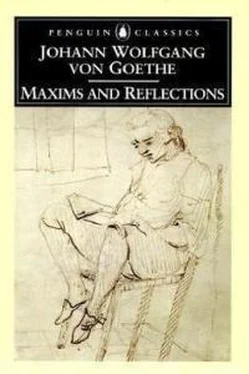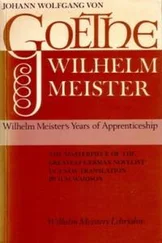413
Lucidity is a due distribution of light and shade.' Hamann .
414
A man who has no acquaintance with foreign languages knows nothing of his own.
415
We must remember that there are many men who, without being productive, are anxious to say something important, and the results are most curious.
416
Deep and earnest thinkers are in a difficult position with regard to the public.
417
Some books seem to have been written, not to teach us anything, but to let us know that the author has known something.
418
An author can show no greater respect for his public than by never bringing it what it expects, but what he himself thinks right and proper in that stage of his own and others' culture in which for the time he finds himself.
419
The so–called Nature–poets are men of active talent, with a fresh stimulus and reaction from an over–cultured, stagnant, mannered epoch of art. They cannot avoid commonplace.
420
Productions are now possible which, without being bad, have no value. They have no value, because they contain nothing; and they are not bad, because a general form of good–workmanship is present to the author's mind.
421
All lyrical work must, as a whole, be perfectly intelligible, but in some particulars a little unintelligible.
422
A romance is a subjective epic in which the author begs leave to treat the world after his own ideas. The only question is, whether he has any ideas; the rest will follow of itself.
423
Subjective or so–called sentimental poetry has now been admitted to an equality with objective and descriptive. This was inevitable; because otherwise the whole of modern poetry would have to be discarded. It is now obvious that when men of truly poetical genius appear, they will describe more of the particular feelings of the inner life than of the general facts of the great life of the world. This has already taken place to such a degree that we have a poetry without figures of speech, which can by no means be refused all praise.
424
Superstition is the poetry of life, and so it does not hurt the poet to be superstitious.
425
That glorious hymn, Veni Creator Spiritus , is really an appeal to genius. That is why it speaks so powerfully to men of intellect and power.
426
Translators are like busy match–makers: they sing the praises of some half–veiled beauty, and extol her charms, and arouse an irresistible longing for the original.
427
A Spinoza in poetry becomes a Machiavelli in philosophy.
428
Against the three unities there is nothing to be said, if the subject is very simple; but there are times when thrice three unities, skilfully interwoven, produce a very pleasant effect.
429
The sentimentality of the English is humorous and tender; of the French, popular and pathetic; of the Germans, naïve and realistic.
430
Mysticism is the scholastic of the heart, the dialectic of the feelings.
431
If a man sets out to reproach an author with obscurity, he should first of all examine his own mind, to see if he is himself all clearness within. Twilight makes even plain writing illegible.
432
It is with books as with new acquaintances. At first we are highly delighted, if we find a general agreement,—if we are pleasantly moved on any of the chief sides of our existence. With a closer acquaintance differences come to light; and then reasonable conduct mainly consists in not shrinking back at once, as may happen in youth, but in keeping firm hold of the things in which we agree, and being quite clear about the things in which we differ, without on that account desiring any union.
433
In psychological reflection the greatest difficulty is this: that inner and outer must always be viewed in parallel lines, or, rather, interwoven. It is a continual systole and diastole, an inspiration and an expiration of the living soul. If this cannot be put into words, it should be carefully marked and noted.
434
My relations with Schiller rested on the decided tendency of both of us towards a single aim, and our common activity rested on the diversity of the means by which we endeavoured to attain that aim.
435
Once when a slight difference was mentioned between us, of which I was reminded by a passage in a letter of his, I made the following reflections: There is a great difference between a poet seeking the particular for the universal, and seeing the universal in the particular. The one gives rise to Allegory, where the particular serves only as instance or example of the general; but the other is the true nature of Poetry, namely, the expression of the particular without any thought of, or reference to, the general. If a man grasps the particular vividly, he also grasps the general, without being aware of it at the time; or he may make the discovery long afterwards.
436
There may be eclectic philosophers, but not an eclectic philosophy.
437
But every one is an eclectic who, out of the things that surround and take place about him, appropriates what is suited to his nature; and this is what is meant by culture and progress, in matters of theory or practice.
438
Various maxims of the ancients, which we are wont to repeat again and again, had a meaning quite different from that which is apt to attach to them in later times.
439
The saying that no one who is unacquainted with or a stranger to geometry should enter the philosopher's school, does not mean that a man must become a mathematician to attain the wisdom of the world.
440
Geometry is here taken in its primary elements, such as are contained in Euclid and laid before every beginner; and then it is the most perfect propædeutic and introduction to philosophy.
441
When a boy begins to understand that an invisible point must always come before a visible one, and that the shortest way between two points is a straight line, before he can draw it on his paper with a pencil, he experiences a certain pride and pleasure. And he is not wrong; for he has the source of all thought opened to him; idea and reality, potentia et actu , are become clear; the philosopher has no new discovery to bring him; as a mathematician, he has found the basis of all thought for himself.
442
And if we turn to that significant utterance, Know thyself , we must not explain it in an ascetic sense. It is in nowise the self–knowledge of our modern hypochondrists, humorists, and self–tormentors. It simply means: pay some attention to yourself; take note of yourself; so that you may know how you come to stand towards those like you and towards the world. This involves no psychological torture; every capable man knows and feels what it means. It is a piece of good advice which every one will find of the greatest advantage in practice.
443
Let us remember how great the ancients were; and especially how the Socratic school holds up to us the source and standard of all life and action, and bids us not indulge in empty speculation, but live and do.
444
So long as our scholastic education takes us back to antiquity and furthers the study of the Greek and Latin languages, we may congratulate ourselves that these studies, so necessary for the higher culture, will never disappear.
445
If we set our gaze on antiquity and earnestly study it, in the desire to form ourselves thereon, we get the feeling as if it were only then that we really became men.
446
The pedagogue, in trying to write and speak Latin, has a higher and grander idea of himself than would be permissible in ordinary life.
447
In the presence of antiquity, the mind that is susceptible to poetry and art feels itself placed in the most pleasing ideal state of nature; and even to this day the Homeric hymns have the power of freeing us, at any rate, for moments, from the frightful burden which the tradition of several thousand years has rolled upon us.
Читать дальше








![Иоганн Гёте - Итальянское путешествие [litres]](/books/398657/iogann-gete-italyanskoe-puteshestvie-litres-thumb.webp)



